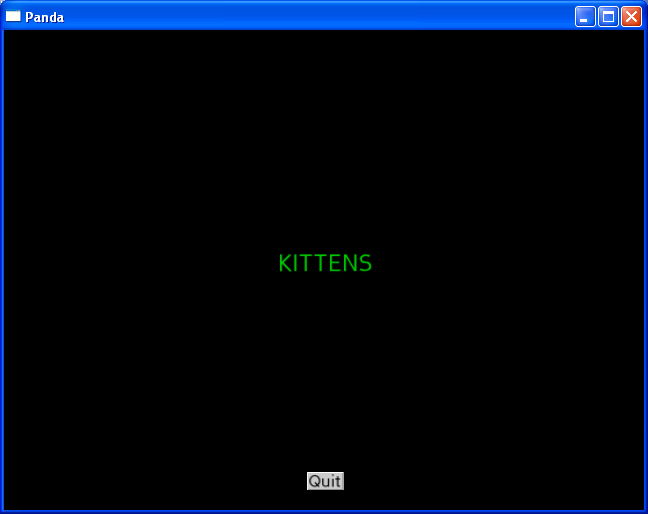Preparations:
Given that we're not to start coding until the official start of the competition, that the theme is being released only on the same day, and that I'm using a set of tools that I'm already familiar with, there's little preparation to be done, I feel.
That said, I intend to use a slightly older--and more saliently, a slightly more reliable--version of the Panda engine than I generally do. Between that and the fact that it's been a little while since last I built a distributable version, let alone in the older version of the engine, I wanted to perform a quick test. I happened to already have a small test-program, so I simply built that, installed it, and tried it. Thankfully there was only two hiccups, neither a serious issue:
- First, I found that I hadn't reinstalled the NSIS installer generator after a recent OS upgrade that seemed to result in the OS losing track of which programs I had installed. Reinstalling it solved the problem.
- Second, while the Windows build worked just as expected, the Linux version failed. This, however, isn't a major issue--I'm in any case a little hesitant to support two platforms under so tight a deadline, so I'm comfortable with just dropping the Linux version.
Here's the result:
(It's not apparent in the following screenshot, but the text switches between various colours, which can be toggled with the space-bar.)
[indent=1]I... I like cats. C-can you tell?
I've also given some thought to how I'll implement the splash screen; I'm glad to say that, using my menu framework, this should be quick and easy.
As with last year, I intend to start with my "template" project, and I'll likely make use components that I've made previously, whether separate and intended for such use, or torn raggedly from their native projects.
Plans:
I've given some thought to how I want to approach the competition. None of the following is set in stone, however; it's a guideline for myself, an aid to planning. I don't plan on working on day seven (although it's quite possible that I'll end up pushing that a little by working through the night of day six), so my list runs up to day six.
Day 1: Conceptualisation.
[indent=1]My experience leads me to feel that I tend to benefit from taking time with design decisions. Naturally, the rather tight schedule of this competition doesn't leave much space for that, but I nevertheless want to avoid being hasty with my choice of game. If I find myself either having only one concept, or very confident of my choice of concept, I might decide to take only half a day for this step.
Day 2: Prototyping
[indent=1]I feel that one of my mistakes last year was not getting a prototype out for people to play. This year I hope to rectify that by completing a prototype by the end of the second day. It will (most likely) have models/sprites/whatever thrown in from those that I have lying around, and neither sound nor music, but it should at least allow me to test the mechanics of my game.
While the following days have other tasks as their identifying elements, they will likely all have at least some time--quite a bit of time, I imagine--dedicated to improving upon the prototype, especially based on feedback given.
Day 3: Graphics
[indent=1]Here I hope to finish at least a first pass at the graphics for the game.
Day 4: Sound and Music
[indent=1]The primary focus of this day is trawling through Sound Image for appropriate music, making sound effects from miscellaneous objects (my own mouth likely included), and implementing these into the game.
Days 5 and 6: Polish and Buffer
[indent=1]As the title suggests, these days are intended to be dedicated to completing and polishing my entry--and also to give me some space into which to expand, against the (very likely) possibility of the project taking longer than intended.
Feelings:
My main anxiety, I suppose, comes from learning the theme only on the day. While I realise that not doing so would likely incur all too high a probability of cheating, I do generally prefer to have some time to think about a game before I actually start working on it. Nevertheless, I take it as part of the challenge!
I've spent some time "practising": taking themes that don't on their surface appeal to me, and turning them into projects that I might enjoy making. My favourite thus far was for the hypothetical theme of "combos". I don't like traditional combos--by which I mean abilities that are activated by some often-arbitrary collection of actions in real-time, as in fighting games. I find them generally unintuitive, and rather un-fun. So, if the theme were "combos", what might I make? In short, what I came up with was a turn-based single-character tactics game in which (known) sequences of single-turn actions produce powerful "combo" abilities. Since the game is turn-based, one doesn't have to remember the arbitrary sequence in the heat of action, and the combos are intended to be attractive due to sheer power and utility. On the other hand, one can only perform a single action per turn, meaning that the player may find themselves with decisions involving whether to go for a combo, or cancel it to deal with an imminent threat--is it better to tank some damage in order to use the combo, or avoid the damage but lose the opportunity?
The other issue that I have in mind is one that I often face in short competitions like this: I like at least a degree of complexity in my projects, but the constraints of a competition like this call for very simple gameplay. The trick for me is to find a concept that's sufficiently simple that I'm likely to complete it in time, but nevertheless sufficiently interesting to me that it sustains my enthusiasm.
But all of that aside, I'm looking forward to the competition: It's a change of pace, a fun contest and challenge, and an opportunity to see what interesting creations my fellow competitors come up with!





